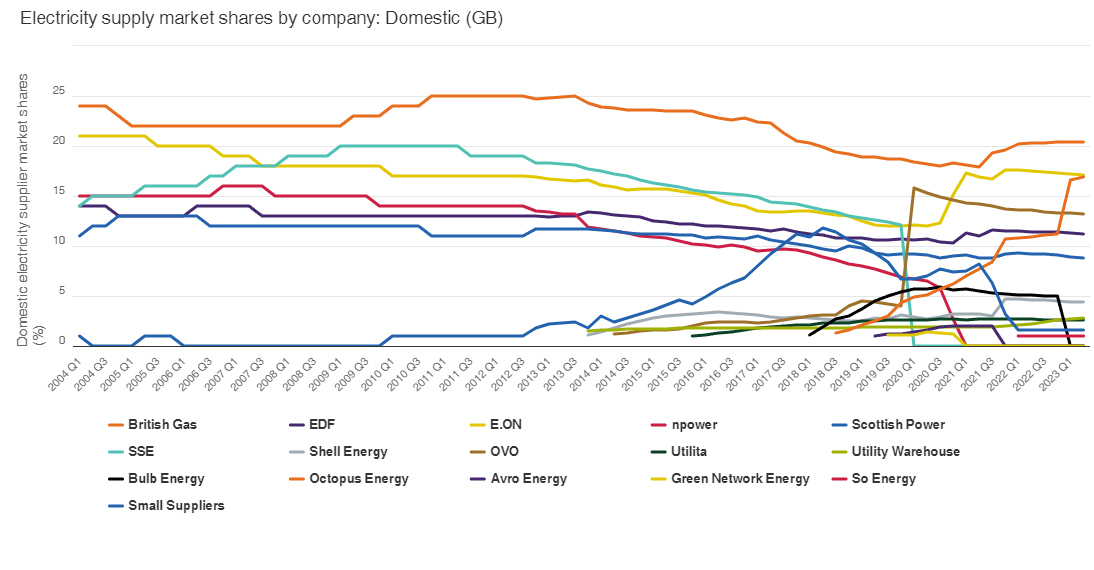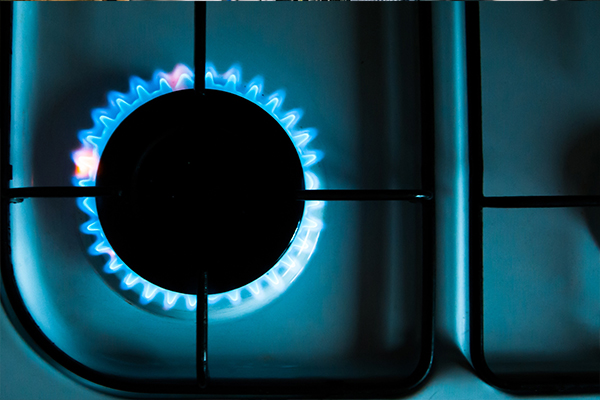| 2023 Q2 | 2023 Q1 | 2022 Q4 | 2022 Q3 | 2022 Q2 | 2022 Q1 | 2021 Q4 | 2021 Q3 | |
| British Gas | 20.4 | 20.4 | 20.4 | 20.3 | 20.3 | 20.2 | 19.6 | 19.3 |
| EDF | 11.2 | 11.3 | 11.4 | 11.4 | 11.4 | 11.5 | 11.5 | 11.6 |
| EON | 17.1 | 17.2 | 17.3 | 17.4 | 17.5 | 17.6 | 17.6 | 17.7 |
| Scottish Power | 8.8 | 8.9 | 9.1 | 9.2 | 9.2 | 9.3 | 9.2 | 8.8 |
| Shell Energy | 4.4 | 4.4 | 4.5 | 4.6 | 4.6 | 4.7 | 4.7 | 3 |
| OVO | 13.2 | 13.3 | 13.3 | 13.4 | 13.6 | 13.6 | 13.7 | 14 |
| Utilita | 2.6 | 2.6 | 2.6 | 2.6 | 2.7 | 2.7 | 2.7 | 2.7 |
| Utility Warehouse | 2.8 | 2.7 | 2.6 | 2.4 | 2.2 | 2.1 | 2 | 1.9 |
| Octopus Energy | 16.9 | 16.6 | 11.2 | 11.1 | 10.9 | 10.8 | 10.7 | 8.4 |
| So Energy | 1 | 1 | 1 | 1 | 1 | 1 | 0 | 0 |
| Small Suppliers | 1.6 | 1.6 | 1.6 | 1.6 | 1.6 | 1.6 | 3.2 | 6.3 |
Compare Electricity Prices
Enter your postcode to compare electricity prices.
Due to market volatility suppliers are removing offers and tariffs without warning.
To guarantee the price you see you will need to switch immediately. Find out more
Are you looking to compare business electricity prices?
Click Here
How to compare and switch electricity suppliers
Your address
Supplier details
Choose tariff
Start saving
Compare Electricity Prices
Since mid 2021 electricity prices have risen substantially with many Britons feeling the pinch with the electricity bills. Prices have started to stabilise and fixed tariffs are coming back to the market. It is easier than ever to compare prices and save money. Simply enter your post code and select your address and we will be able to look up your current usage, cost and supplier to give you the most accurate comparison ever.

When should you switch electricity suppliers?
You can switch whenever you want but you might have an early exit fee to pay if you are in a fixed contract. You can switch fee free 49 days before the end of your contract and doing it before the end of your contract means you will wont roll on to the standard variable contract which is typically more expensive. If you are not in a fixed contract (which means you will be on a standard variable contract) then you can switch at any time.
When should you switch electricity suppliers?
You can switch whenever you want but you might have an early exit fee to pay if you are in a fixed contract. You can switch fee free 49 days before the end of your contract and doing it before the end of your contract means you will wont roll on to the standard variable contract which is typically more expensive. If you are not in a fixed contract (which means you will be on a standard variable contract) then you can switch at any time.
Why should you switch electricity suppliers?
If you don’t switch your electricity supply when your fixed term plan is coming to an end, your supplier will automatically switch your contract to a standard rate electricity tariff which can be really expensive. If you haven’t switched your electricity contract or electricity supplier during last 2 to 3 years or have never switched your electricity contract then you are more than likely to be on the energy supplier’s standard electricity tariff. More than half of the UK households are on standard variable tariffs which is unfortunate as these tariffs are one of the most expensive electricity plans so by switching you can get cheaper plan and save money too.
Most people switch from one electricity supplier to another to save money, however another reason to switch could be customer service or you want to have green energy plan which is not supported by your current energy supplier.

What should I do to reduce my electricity bills?
There small steps can help you reduce your electricity bills:
- Use energy saving light bulbs such as LED lamps
- Have better insulation at your property
- Use of efficient and energy saving appliances
- Installing smart meter can help you see where and when you are using most energy
- Turn of any appliances that are on standby for a long period of time
Electricity price comparison and switch
It is important to compare electricity prices to find tailored electricity quotes to suit your needs. Electricity prices can vary depending on your area and household needs. We (Free Price Compare) can help you run an electricity rate comparison in few minutes to find a cheaper electricity supplier.
Step 1 – Where you live
You need to enter your postcode and choose the address of the property for which you are looking to run the electricity comparison on.
Step 2 – Your supplier details
Our system will identify who your supplier is, what tariff you are on and what your usage is. You simply need to confirm this is correct
Step 3 – How much electricity you are using
View the plans available and select which one you want to switch to
Once you are happy with a plan or supplier, we will take care of any paperwork required. We will inform your new electricity supplier and current supplier about the switch to arrange switchover date.
The electricity switch can be completed within 17 days, it will always take at least 2 weeks because you have 14 days cooling off period if you decided to change your mind. Sometimes the switch can take up to 28 days but this is rare.
Type of electricity meters
There are 3 different types of electricity meters:
- 1. Credit meter –Traditional electricity meter and most of the UK houses have credit electricity meters.
- 2. Smart meter - New generation meters which can record and report readings to electricity suppliers
- 3. Prepayment meter –Allows you to pay for your electricity before using it. Prepaid tariffs are usually more expensive than others.
The Concept of Energy Price Cap
In recent years, the concept of energy price cap has gained attention in the energy market. A price cap is a maximum limit set by the regulatory authority, such as Ofgem in the UK, to prevent supplier price exploitation and protect consumers. The energy price cap aims to provide financial protection to vulnerable energy consumers and ensure fairness in the energy market. Its purpose is to make energy costs more predictable and manageable for consumers, especially those on standard variable tariffs. By understanding the energy price cap, consumers can have greater control over their energy expenditures and avoid sudden price hikes.
Definition and Purpose of Energy Price Cap
The energy price cap, also known as the default tariff cap, is a regulatory mechanism put in place by the government to protect energy consumers from paying excessively high prices. It sets a limit on the rates energy suppliers can charge for standard variable tariffs and default energy tariffs. The purpose of the energy price cap is to ensure that energy costs remain affordable and transparent for consumers, especially those who have not switched to fixed-term deals or better energy tariffs. It aims to create a fair and balanced energy market by preventing suppliers from exploiting customers through unreasonably high rates.
Impact of Energy Price Cap on Consumers
The energy price cap has several positive impacts on energy consumers. Firstly, it provides stability and predictability by limiting the price fluctuations that could occur with standard variable or default tariffs. This allows consumers to budget and plan their energy expenses effectively. Secondly, the price cap safeguards consumers from sudden and unjustifiable price increases, ensuring that energy costs remain within reasonable limits. It enhances consumer confidence and trust in the energy market, knowing that they are protected from supplier price exploitation. Lastly, the energy price cap offers peace of mind and financial protection to vulnerable consumers, ensuring that energy bills are manageable and affordable.
How to Compare Energy Prices Effectively
When it comes to comparing electricity prices, the process may seem overwhelming. However, with the right approach, you can navigate the energy market and find the best deal for your needs. Comparing energy prices effectively involves several steps and considerations, including gathering information, analysing different tariffs, and evaluating the contract terms. By following a systematic method, you can ensure that you make an informed decision and choose the best energy deal available. In the next section, we will provide a step-by-step guide to help you compare energy prices more efficiently and identify the key factors to consider when making your comparison.
Step-by-step Guide to Comparing Energy Prices
When comparing energy prices, start by gathering details on current energy usage and tariff information. Utilise reliable comparison platforms and analyse elements of energy tariffs like unit rates and standing charges. Consider contract terms and potential exit fees, then choose the best energy deal based on comparison results and supplier reviews.
Key Factors to Consider When Comparing Energy Deals
When comparing energy deals, it's crucial to assess customer service quality, payment method options, and energy tariff types. Aligning energy usage patterns with tariff structures and reviewing the impact of new tariffs and green energy options are also vital. These factors ensure an effective comparison of energy deals.
Comparing Gas and Electricity Deals Separately
When comparing gas and electricity deals, consider wholesale energy prices, standard variable tariff, dual fuel options, direct debit benefits, and the switching process. Evaluate the easiest way to switch, unlocking the cheapest deal and energy price guarantee. Look into fixed price and variable tariffs for the right deal.
Pros and Cons of Comparing Gas and Electricity Deals Individually
Exploring the trade-offs of individually comparing gas and electricity deals helps understand the advantages and disadvantages. By weighing the benefits and drawbacks of separate evaluations, one can make informed decisions. Assessing gas and electricity deals individually is crucial for understanding their positives and negatives.
Tips for Getting the Best Gas and Electricity Deals
Discovering effective strategies for securing the most competitive gas and electricity deals involves obtaining valuable tips and practical advice. Exploring expert insights for acquiring the best deals includes finding the most favourable options and acquiring useful insights.
Switching Energy Suppliers
Understanding the importance of wholesale energy prices. Exploring the benefits of a dual fuel tariff and direct debit. Knowing the easiest way to switch suppliers and the importance of meter readings. Discussing the energy switch guarantee and finding the right deal for you.
Reasons to Switch Energy Suppliers
Uncovering compelling motivations for changing energy suppliers is vital. Exploring the various incentives and reasons for making this switch can reveal potential savings and benefits. Understanding the driving forces behind such a change can lead to finding the right deal and ensuring the best rates.
How to Switch Energy Suppliers Without Hassle
Explore efficient methods for seamlessly changing your energy provider. Discover convenient approaches that streamline the transition without unnecessary inconveniences. Obtain practical tips for a hassle-free switch, ensuring a smooth process. Access strategies to minimise disruptions when transitioning to a new energy supplier.
Green Electricity Deals: An Emerging Trend
Green electricity deals are gaining traction in the market—wholesale energy prices, fixed-price tariffs, and dual fuel options are some offerings. Customers benefit from new deals and easy switching processes. Ofgem ensures energy switch guarantees and price protections. The UK's postcode plays a role in finding the right deal.
What are Green electricity Deals?
Green electricity deals refer to the specific offers and packages available in the market that focus on renewable sources of energy. These deals aim to promote sustainability and reduce carbon emissions. By understanding their nature, features, and components, consumers can make informed decisions about choosing green energy options.
Benefits of Green Energy Deals
Gain valuable insights into the positive impacts and advantages of choosing green energy deals. Understand the various benefits offered by embracing green energy deals over conventional options, and discover the favourable outcomes associated with it.
Smart Meters and Energy Consumption
Smart meters track energy usage in real-time, enabling informed decisions. They promote energy efficiency and help consumers save on bills. Understanding energy consumption patterns can lead to smarter usage and reduced costs. This technology aligns with the overall theme of comparing electricity prices and finding the best deal.
Can a Smart Meter Help Save Money?
Yes, a smart meter can help save money on electricity bills by changing your behaviour. By providing real-time data on energy consumption, consumers can adjust their usage habits and track their energy usage and costs more accurately. Additionally, some utility companies offer time-of-use pricing plans that reward customers for using electricity during off-peak hours.

Are Energy Prices Expected to Rise or Fall in the Near Future?
Energy prices in the near future are expected to fluctuate due to various factors. These include supply and demand, weather conditions, and geopolitical events. With renewable energy sources gaining popularity, there is a possibility of lower prices as they become more competitive with traditional sources. Regularly comparing electricity prices is important to ensure you get the best deal.
Understanding Electricity Market Dynamics
The electricity market operates on the principles of supply and demand, where wholesale energy prices fluctuate based on various factors. The price consumers pay for electricity is determined by their energy tariff, which includes the unit rates and standing charges set by energy suppliers.
Factors Affecting Electricity Prices
Several factors contribute to the fluctuation of electricity prices in the market. Global economic conditions play a significant role, as changes in economic growth and development can impact energy prices. Political instability, international relations, and conflicts in energy-producing regions can also influence electricity prices. Environmental policies and regulations, such as carbon pricing, renewable energy targets, and emissions trading schemes, play a crucial role in shaping energy prices and the overall energy market. Technological advancements and innovations in energy generation and distribution can affect energy prices, as new technologies often require significant investments. Additionally, weather patterns and natural disasters, such as extreme temperatures and hurricanes, can lead to volatility in energy prices.
Current Trends in the Energy Market
The energy market is constantly evolving, and staying updated with the current trends can help you make informed decisions when comparing electricity prices. One of the significant trends in the energy market is the increasing adoption of renewable energy sources. As the world shifts towards a more sustainable future, renewable energy technologies, such as solar and wind power, are gaining prominence. Additionally, energy storage technologies, smart grid systems, and the growing demand for electric vehicles are shaping the current energy market landscape. Moreover, energy efficiency initiatives are playing a crucial role in reducing energy consumption and influencing energy prices.
Domestic electricity market share by individual energy suppliers
Electricity prices Frequently asked questions
- Your current electricity tariff details
- How much you are paying for your electricity
- Your electricity usage (Spend per month or year / kWh per month or year)
- Current electricity supplier name
- Your preferred payment method
- The address where you want compare electricity supply
As a tenant you can switch your electricity supplier if you are responsible for paying your electricity bill and you are the named account holder. If your tenancy agreement has all bills inclusive then your landlord is responsible to compare electricity prices and switch to their preferred electricity suppliers.
Yes, you can compare electricity prepayment meters and switch supplier to your preferred choice. However, not all energy suppliers offer prepayment meters meaning the energy supplier options will be limited.
Yes, we can help you compare business electricity prices to find better contract for you and your business. Click here to compare business electricity prices
If you have feed-in tariff (FIT), you can still switch electricity supplier as the Ofgem industry regulator sets prices for FIT’s (feed-in-tariffs). You can simply switch to another supplier without any hassle.
The simple answer is no. When switching your electricity supplier, your meter and wires remain the same, it is only your prices and bills that will come from another supplier. Your electricity supply still remains the same as it was.
If your electricity supplier is offering to install smart meters then you can ask them to install one for you. If not, you can ask them to inform you when they do.
Not all suppliers support green electricity tariffs; however, you can switch to those who offer green energy tariffs. Green electricity generated from renewable sources such as wind, plants, sunlight and geothermal heat.
Economy 10 electricity meters – It’s a multi rate electricity meter which offers cheaper electricity rates at certain times. It’s similar to economy 7 meter but offers 3 extra hours off peak per day.
Economy 7 electricity meters – Economy 7 electricity meter is another electric meter type which offers you cheaper rates at night and higher electricity unit rates during the day time. Economy 7 meters would be useful for those household, who use most electricity during night time.
Looking for something else?
Customers switching from 01/01/2020 to 31/12/2020 saved an average of £318 a year on a dual fuel tariff.



















